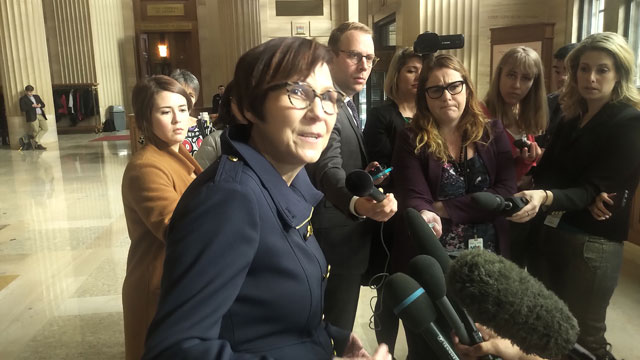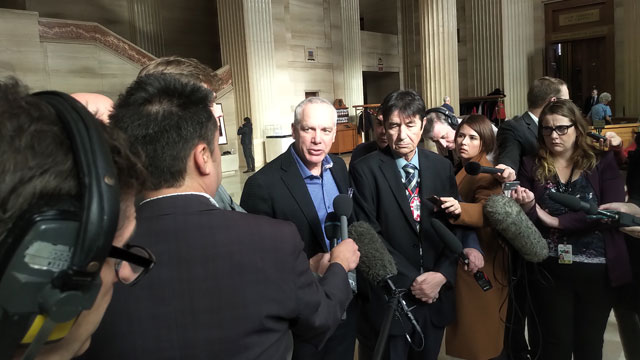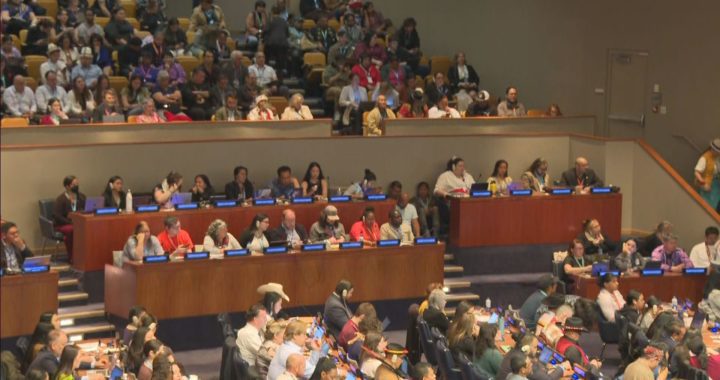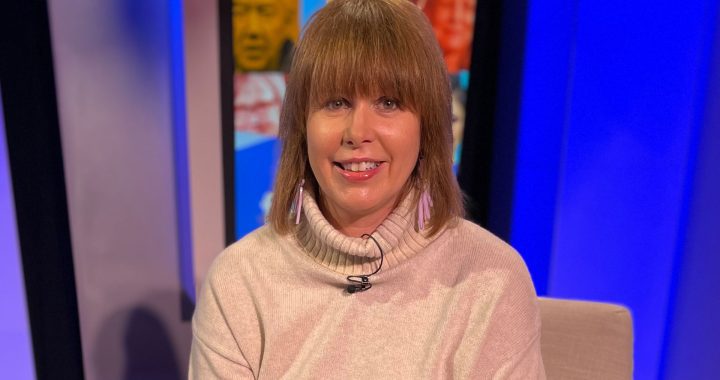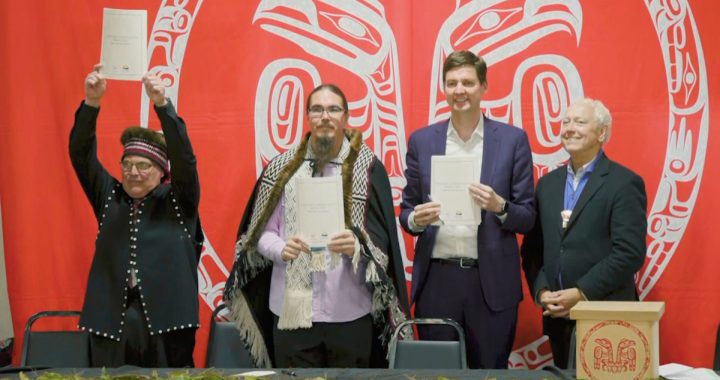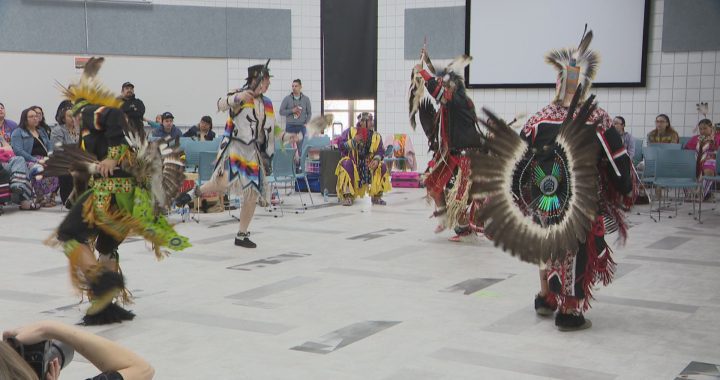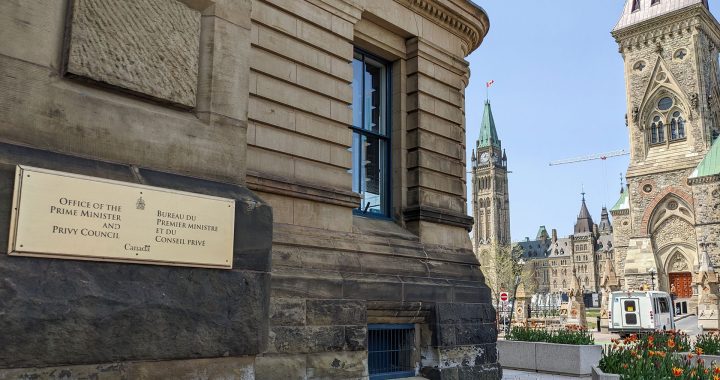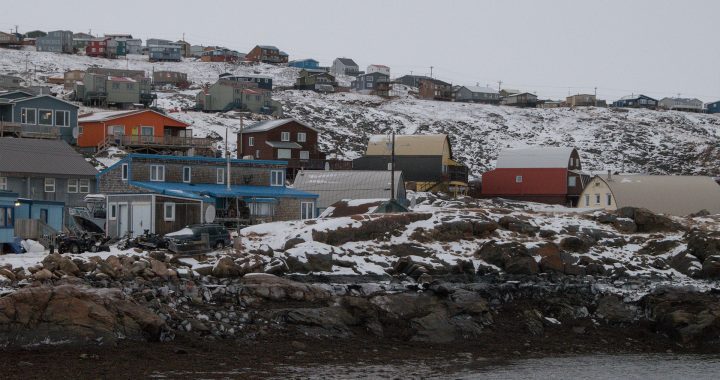Lindsay Richardson and Jamie Pashagumskum
APTN News
The Canadian government’s appeal seeking to pause a human rights judgement in favour of Indigenous children is a strategic move to “shop for the right court,” Cindy Blackstock told reporters Tuesday after two days in a Federal Court hearing.
“It feels like [Canada] kind of just trying to find a place that agrees with them,” Blackstock said. “If any of us did this to children in society, we wouldn’t be given permission to go around shopping courts to see who would give us the best deal”
“It’s about accepting responsibility as adults towards children,” she added.
The federal government is asking that a ruling from the Canadian Human Rights Tribunal (CHRT) that could potentially see thousands Indigenous children who were made wards of the state receive $40,000 in compensation for “irreparable harm,” be paused until a judicial review of the ruling can be heard.
After two days of arguments and over a decade of prior disputes, Crown lawyers and representatives of the First Nations Child and Family Caring Society rendered their closing statements on Tuesday.
If Judge Paul Favel doesn’t throw out the ruling, Canada is asking for a thorough review of it.
Instead of heeding the tribunal’s direct orders, federal representatives say they want to institute their own process to oversee compensation.
The contentious debate began in early September, when the CHRT ruled that the Canadian government had “willfully” and “recklessly” upheld child welfare policies that discriminated against Indigenous children and their families.
After the Feds were given 30 days to respond, Prime Minister Justin Trudeau issued an eleventh-hour appeal to the ruling while in the midst of the 2019 federal election campaign.
A payout, he said at the time, was not feasible while an election – and possible government upheaval – were imminent.
(Cindy Blackstock answering questions from reporters outside Federal Court on Monday. APTN file)
However, during two days of presentations before Judge Favel, Crown lawyers requested that the ruling be overturned so Canada can tackle the issue without the tribunal’s influence.
Upholding the judgement ordering compensation, they stated, is “wrong in law,” and outside of the tribunal’s usual jurisdiction.
In closing arguments, Crown attorney Robert Frater said abiding by the ruling would be comparable to performing an unnecessarily invasive surgery with the wrong doctor.
But Blackstock says the caring society only turned to the tribunal for intervention because they were instructed by Canada to do so.
“We wanted to mediate, but Canada said ‘no – we’re going to have to litigate this with the tribunal,” she added. “So they got what they wanted – which is an order.”
The crux of the Crown’s argument, as heard during the two-day audience, is that the tribunal ordered compensation in a ruling akin to a class-action lawsuit, which they are technically not authorized to do.
In fact, the government has found its way to consent to a $6 billion class action lawsuit launched by Xavier Moushoom from Lac Simon, Quebec.
“We will work with plaintiff’s counsel with the goal of moving forward with certification of the Xavier Moushoom and Jeremy Meawasige v. The Attorney General of Canada class action. This case seeks compensation for First Nations children who suffered as a result of under funding of child and family services, and as a result of awaiting services under Jordan’s Principle,” said a joint statement released Monday by Justice Minister David Lametti and Indigenous Services Minister Marc Miller.
Details in that lawsuit mirror many of the complaints the human rights commission and tribunal have heard in the 12 years the case has been running.
At one point the government asked Blackstock if she’d drop the tribunal compensation case and join the class action.
She said only if the government consented to the class certification.
Blackstock said she never heard from the government after that.
According to David Sterns, one of the lawyers representing Moushoom, it’s a big step forward.
“This will allow us to bypass a lengthy process known as the certification process and proceed directly either to trial or toward a negotiated resolution,” said lawyer David Sterns, one of the lawyers representing Moushoom.
Blackstock said yesterday that nothing is stopping the government from also pursuing a class action in a “value added” scenario, which could theoretically include children who entered the state’s care prior to, or after the dates outlined in the tribunal ruling.
Canada, for its part, argued that the biggest harm would be done to the country’s justice system if the ruling and subsequent payouts are upheld.
On Monday, Frater used language that representatives from the caring society later admonished as symptomatic of Canada’s “flawed colonialist system.”
Julian Falconer, legal counsel for the Nishnawbe Aski Nation (NAN), called Frater out for being “disingenuous” after the latter expressed concerns about the tribunal’s compensation plan being exclusionary.
Frater’s preliminary statements drove Timmins-James Bay MP Charlie Angus from the courtroom early on in the hearing. On Monday evening, he tweeted about his frustration, attaching photos of four Indigenous children who died while in state care.
“I sat in court listening to Justin Trudeau’s lawyers argue that Canada is suffering the most in these hearings,” Angus wrote. “I thought of Kanina Sue Turtle, Tammy Keeash, Azraya Kokopenance, Courtney Scott.”
“God damn it Canada,” the tweet reads. “These children needed you. And you spent money on lawyers.”
Read More:
Federal government challenging tribunal order to compensate First Nations children in care
Death as Expected: Inside a child welfare system where 102 Indigenous kids died over 5 years
On Tuesday, Angus returned in the company of NDP leader Jagmeet Singh.
During the recent electoral campaign, Singh and Green Party Leader Elizabeth May were the only two Federal party leaders who said they would not have challenged the tribunal’s order.
Singh previously conferred with Trudeau on the topic during one-on-one meetings, asserting at the time that Canada needed to drop its appeal and start funding Indigenous kids properly.
“Kids have died. Kids have died because the government has not funded [them] equally,” Singh explained. “For the government to make any other argument in this case, to me, shows that they’re not respecting the impact of that discrimination.”
In statements made Monday, family lawyer Sarah Clarke – speaking on behalf of the caring society- requested an abeyance, or a suspension in proceedings for the judicial review, so that all parties can return to the drawing board to formulate a workable compensation scheme for the children and their immediate family using the framework provided in the tribunal’s ruling.
Singh said the Crown’s intent to dole out compensation without the tribunal’s oversight is hard to accept, or believe, given an overall lack of goodwill demonstrated by the parties in power over the last 13 years.
“How can anyone who’s faced that injustice believe that the government is going to now magically do what’s right?” Singh explained.
“Let’s be really clear: we’ve seen this government cut a cheque for $14 billion to the richest corporations, we’ve seen this government waive corporate loans to the tune of $6 billion,” he added.
In closing, Frater reiterated the importance of the request for a judicial review. He says he’d like to avoid a “blue sky discussion about possibilities” and a compensation order that, in the Crown’s opinion, isn’t “fair or equitable to all.”
The government, according to Frater, is the only party in favour of a conversation “free from the tribunal’s shackles,” and instead recommended an early judicial review to appease both the Crown and lawyers from the caring society.
Canada’s interests, Frater says, were “misdescribed” by the respondents’ use of “highly charged language” during Monday’s presentation.
The caring society acknowledged the validity of the Crown’s concern about “fair” treatment of the issue; with respect to this perspective, Clarke said the two opposing parties are arguing “from the same side of the coin.”
However, the arguments presented by Clarke and her colleagues, Frater said, constitute a “strong emotional case” with questionable legal traction.
“Canada has no emotional case to make here,” Frater said.
“These aren’t emotional pleas” Falconer countered. “These are an entitlement to compensation in respect of discrimination, in respect of robbing generations of Indigenous people of their children. Unnecessarily removing children from their homes because of racism and colonialism.”
“I find that offensive, and frankly, patronizing and demeaning,” he added.
(NAN lawyer Julian Falconer, left, says Canada’s arguments at the Federal Court were ‘disingenuous.’ APTN file)
But throughout the proceedings, Canada – according to the caring society – did not provide any concrete evidence as to why they cannot, or will not, work under the tribunal’s guidance to reach a resolution.
Proof, Clarke said, that the government is not prepared to live up to the remedies that the tribunal’s proposed compensation scheme provides.
For the past 13 years, children have been waiting while Canada has been sitting on its hands and continuing to prioritize the wealthy and powerful over the marginalized, according to child advocates.
The tribunal’s ruling is about righting the wrongs of the past, Blackstock’s team argued – not only about righting systemic wrongs moving forward.
“This can only help our youth to validate their worth as who they are, as human beings – not to be treated like third-class citizens in our homelands in Canada,” said Walter Naveau, deputy grand chief of NAN, a organization that represents 49 First Nations in northern Ontario.
Canada’s disregard for their well being, Falconer said, is “what colonialism looks like.”
Additionally, Clarke added, the Crown’s request for a judicial review rests on the understanding that Canada would have to immediately “cut a cheque,” as Frater put it.
The only legal obligation moving forward, according to Stuart Wuttke, attorney for the Assembly of First Nations, is to take a seat at the table and initiate a discussion.
Leaving it up to Canada to act on their volition could be a lengthy and repetitive process, Wuttke said.
According to the caring society, it is unfair for the federal government to show up and say that they did, in fact, discriminate against Indigenous children, but still demand a judicial review based on the compensation order alone.
“Canada has fought these children every step of the way. Does it really make sense at this stage to trust the government when we look at their track record?” Clarke asked Favel.
Ruling in favour of an abeyance – a move endorsed by Ontario Chiefs – would be the best way forward considering a looming December deadline, they say.
Clarke said the tribunal doesn’t rush processes like these because they understand the gravity and sensitivity surrounding the issues up for debate. The Caring Society has faith they will take their time to assess the facts, and do so “properly.”
The goal above all, she says, is to “restore [Indigenous childrens’)dignity and amplify their voices once again.”
Before Favel reserved his judgement, he told the parties that he’s heard and understands their arguments about the urgency of this decision, and will be working to render his findings “very quickly.”
He did not give a timeline, but said counsel will be notified once a decision is made.
Despite the heated exchanges held over the last 48 hours, Blackstock says she feels confident that Favel will rule in the caring society’s – and by proxy, the children’s – favour.
The government, she explained, has never been successful when appealing tribunal judgements. Of the 15 tribunal decisions made, Canada won one – but it was later overturned by the Federal court.
“With Canadians standing with the children, no matter what happens with this decision, I’m confident that not only the kids will win, but the country will win too,” Blackstock told reporters.
As the debate rages on, it continues to conjure strong emotions from those who were also apprehended and forced into government-run institutions like Indian day schools or residential schools, for example.
Kaniente Patricia Stacey, 64, went to Indian Day school when she was 8-years-old.
She travelled from Kahnawà:ke Mohawk Territory in Quebec to deliver a song and message to Blackstock, thanking her for her unwavering commitment to otherwise unseen Indigenous children.
“I was a child, and I know what it is to be damaged,” she told APTN. “And nobody listens; nobody wants to hear you.”
“Those children who have never been able to speak – I speak for them too,” Stacey added. “I was a child, and I’m still waiting for my story to be heard.”
But Stacey came bearing a message for the Prime Minister as well.
“It has to end – all the trauma that everybody survived,” Stacey added. “If Justin Trudeau’s children were there, what would he do? Let’s ask him that question – he and his wife.”
“What would all you politicians do?”
Correction: the original story posted on Nov. 26 said the Mushroom class action was for $3 billion. The article also said the government asked the court to “quash” the decision. It was asking that it be put on hold until a judicial review was carried out.



